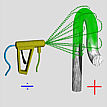|
Process
|
Electrostatic spray painting
|

|
Used to reduce overspray and therefore material waste. Suitable for obtaining very uniform and regular coating layers also on external angles and edges, but not for internal ones, because of the Faraday effect.
The substrate is connected to the ground. The paint particles are negativly charged (while atomized or after having been atomized by the air or airless methods) through a connection of the spraying-gun to a generator.
The difference in charge leads the particles towards the substrate to obtain the coating. Very expensive equipment. Not suitable for all kind of paints.
|
Danish Name
|
Elektrostatisk sprøjtning
|
Category
|
Surface treatments, Painting
|
Materials
|
Polyurethan paints |
References |
Bjerrum Nielsen Holding ApS
Jydsk Aluminium Industri A/S
Nycoat ApS
|
Price notes
|
The values between parenthesis don't have any empirical confirmation, but are just reasonable theoretical extrapolations. In fact, usually, small parts are not produced in small runs.
|
|
| DKK/part |
100 parts |
1000 |
10000 |
| Small (1cm2) |
(0.9) |
(0.6) |
0.45 |
| Medium (1m2) |
120 |
100 |
85 |
| Large (10m2) |
750 |
650 |
500 |
|
Price date
|
November 1996
|
Additional info
|
For electrostatic painting, the material price is not as important as the cost of labour related to pre- and post-treatments. Paint usually is a powder whose price depends on the colour and quality (35-100 DKK/Kg, 4-5 m2/Kg).
|
Photo
|
Thomas Nissen (Computer graphics)
|
Copyright
|
© 1996-2019 Torben Lenau
This page is part of Design inSite
Disclaimer
|
